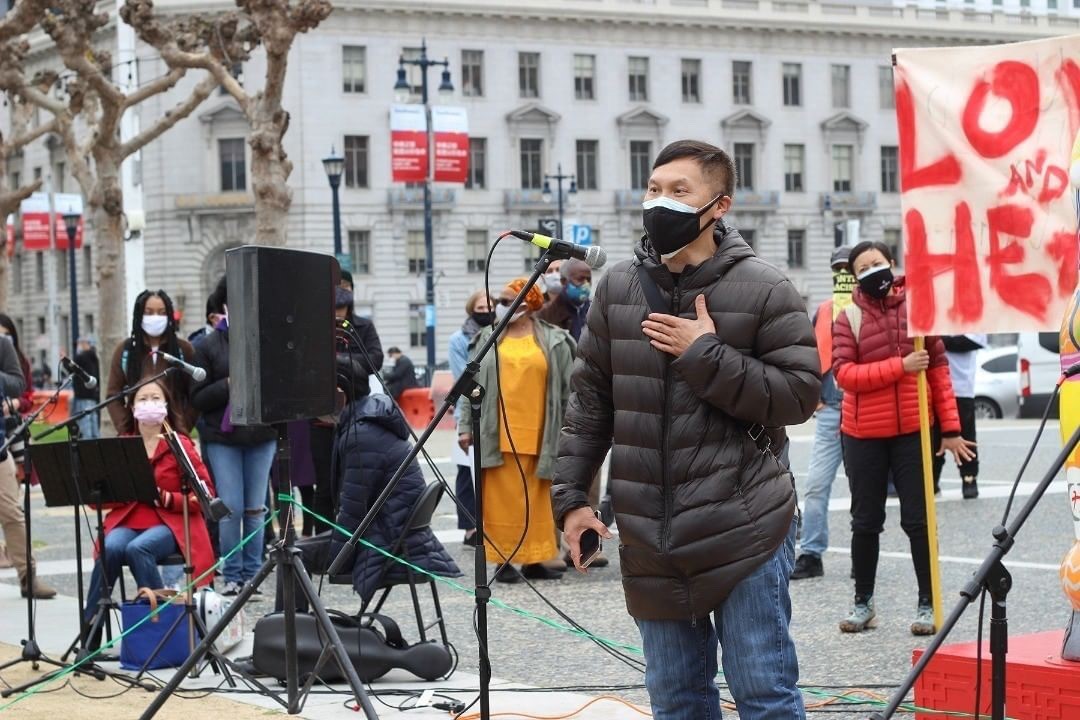Eddy Zheng of Oakland spent nearly 20 years in prison for a crime he committed when he was 16; nevertheless, he considers himself a lucky guy.
“I’ve been surrounded by fortuitous people,” Zheng says, referring to an old Chinese saying that there are “fortuitous people” in our lives — those who show up when we least expect it, to support and inspire us.
It was these fortuitous people — including a documentary filmmaker and a friend of his sister’s who was a venture capitalist — who helped Zheng, a Chinese immigrant, break free of the “school-to-prison-to-deportation pipeline” and eventually to found the New Breath Foundation. New Breath is a nonprofit offering hope, healing, and new beginnings to Asian American and Pacific Islander immigrants and refugees, survivors of violence, and those impacted by incarceration and deportation.
One of New Breath’s primary grantees is Oakland’s Asian Prisoner Support Committee, supporting more than 1,000 current and formerly incarcerated individuals through prison and reentry programs, like educational programs and community immersion.
This work is vital — 600,000 people are released each year from correctional institutions in the United States (which incarcerates people at a higher rate than any other country in the world). An analysis by the Prison Policy Initiative shows that the unemployment rate for formerly incarcerated people is more than 27%, higher than the general unemployment rate has been during any historical period, including the Great Depression. Formerly incarcerated individuals are also almost 10 times more likely to be homeless than the general public. Without basic resources like housing and jobs, 75% are rearrested within five years — perpetuating a vicious cycle of mass incarceration.
Here in California, nearly one in five people have a criminal conviction on their record, which impedes applications for employment, loans, and more. A 2017 survey of more than 2,000 Californians revealed that these barriers have negatively impacted 76% of people with a criminal conviction. This is damaging and counterproductive — not only for the formerly incarcerated and their families but for our communities and our economy.
How your choice can help
It doesn’t have to be this way. Those who want to effect change can do so in small but meaningful ways — one of which is making smart choices about where they bank.
Each time someone deposits their paycheck in a bank, they’re funding that institution’s investment choices. Too often, those investments are in harmful sectors, such as private prisons or fossil fuels, which may not align with an individual’s values. At Beneficial State Bank, we believe in banking for good. That’s why we, and other values-based banks, are committed to investing depositor money only into organizations that nourish our communities.
Zheng considers his choice to bank with Beneficial State to be core to the New Breath mission: “Instead of investing in corporations, we are investing in each other — here, where we live and work — and can see the results of our investments.”
Beneficial State Bank also provides direct support to formerly incarcerated individuals through the Ready for Life program, an initiative of CROP (Creating Restorative Opportunities and Programs), also headquartered in Oakland. Ready for Life provides leadership coaching, skills development, employment opportunities, and housing support to an inaugural class of 15 individuals who have exited the prison system. The participants also receive a monthly stipend to live on.
In line with its values, Beneficial State Bank is offering financial literacy training to the Ready for Life participants, providing them with the skills to set up a credit card, build their credit score, and plan for their financial future.
Ensuring your money nourishes a more just, equitable, and welcoming Oakland isn’t difficult if you know where to begin. Here are three steps you can take to start the process:
- Educate yourself on how banks use your money. If you already have a bank, you can check its website or ask where the bank invests your money and how it actively supports local communities. Good sources of information include: Mighty Deposits, Green America, and Rainforest Action Network.
- Select a bank that invests in doing good. Values-based banks demonstrate that a bank can generate positive social and environmental impact while remaining financially sustainable. One way to identify a values-based bank is to check if it’s a certified B Corporation, which means it meets the highest standards of social and environmental performance as well as accountability and transparency.
- Encourage friends and family to put their money to good use. Let them know that where they bank matters — their money can be used to help or harm. Beneficial State has resources here, and Stop the Money Pipeline has a useful checklist, as well.
We can, and should, ask more from our banking system. While the challenges ahead are many, formerly incarcerated community members can build a new life that will benefit us all, with our collective support.


